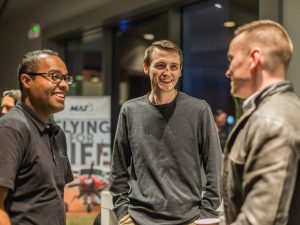If someone asked me to tell them who I am, I would hope to first say that I am a Christian. I would then allude to my ethnicity and citizenship as a Nigerian-Canadian. But perhaps before any of those statements, I would actually tell you that I am a university student at Waterloo.
I would mention that I am in my third year, that I’m studying Mechanical Engineering. The fact is, my education and my field of study are the areas of life by which I first define myself. I wonder if I’m the only student who thinks this way. I wonder if this is a struggle for most Christian university students.
I have found university life to be a culture unto itself. It doesn’t matter what course you’re taking, you can likely relate to the struggles of waking up and maybe not waking up for 8 a.m. classes, living on instant ramen and late night McDonald’s runs, and learning an entire course the night before the midterm. I don’t know about you, but this encompasses the vast majority of my university experience.
I love engineering student life
As stressful and painful as university culture can be, I will confess that I love it. I love being a university student. I love studying to be an engineer. I like to think logically. Maths and Science came naturally to me in elementary and high school, and the idea of creating a tangible object from an idea or a sketch excites me before it frightens me. I think I was wired to be an engineer.
While my “engineering mind” and love for university culture, and the engineering culture specifically, have indeed served me well in my schooling, they have presented and continue to present difficulties in fully comprehending and living out my faith as a believer.
I love studying to be an engineer. I like to think logically. Maths and Science came naturally to me in elementary and high school, and the idea of creating a tangible object from an idea or a sketch excites me… I think I was wired to be an engineer.
One principle that drew me to the field of engineering, for instance, is the fact that there is little room for error. I have learned that this field is built on accuracy. When designing, precision and attention to detail are everything. Every possible failure must be considered.
In my first year, I learned about tolerancing, a dimensioning practice where the amount of acceptable error is specified for every dimension in a drawing. All of these important actions are completed with the aim of minimizing error and avoiding the fatal consequences that may follow. Even just studying to be an engineer leaves little room for mistakes. I’ve witnessed first-hand how inattention to detail or too many moments of distraction can lead to failing a course or even failing a whole semester.
And what about the engineering culture itself? A common idea is that “it’s all about what you can do.” I will admit, there is a certain camaraderie that comes with surviving four or five years of self-induced academic pain. But despite this, engineering is still very much an individual sport. And at the end of the day, I alone am responsible for my success and failure. And I enjoy and thrive within that responsibility.
However, I know, this perspective can produce both confidence and panic. Engineering students are well known for taking pride and boasting in their abilities and natural intelligence. Yet, most of those same engineering students will have to come face-to-face with the painful reality that neither abilities nor intelligence guarantee immunity to the difficulties of school and the challenges of life.
No rest for the wicked, nor for the engineer
And here’s another common engineering belief: “If you don’t burn out, you’re not working hard enough.” There is no rest for the wicked, and apparently no rest for the engineer either. In my first year, I was surprised at the number of times I heard people brag about the few hours of sleep they were able to function on. Engineering culture is one built on pushing yourself to, and even past, the brink of total exhaustion. All-nighters are celebrated by my peers, and although they are not explicitly encouraged by faculty staff, the level of work assigned often leaves students with no other options.
Engineering culture is one built on pushing yourself to, and even past, the brink of total exhaustion.
There is margin for grace
The requirement for accuracy is “It’s all about what you can do,” or “If you don’t burn out, you’re not working hard enough.” These are the perspectives that I have found to cause the most difficulty in my comprehension of the gospel. But I’m learning.
God calls us to live a holy and blameless life, but there is room for error. I have learned that this room is called grace, because all have sinned and fall continuously short of the glory of God (Romans 3:23). As Paul mentioned, this is not advocating for sinning intentionally so that grace may abound (Romans 6:1-2), but I have found that living in the constant worry and guilt that my actions and thoughts are imperfect is not Christianity, it is legalism.
Christianity is not all about what we can do. In fact, it’s the complete opposite. It’s all about what we could not do for ourselves and what Jesus had to do for us. We are not saved by our actions, our intelligence, or by our innate goodness, we are saved by our belief in Jesus’ sacrificial death on the cross and his resurrection and triumph over sin. This should change everything; if we couldn’t grant ourselves salvation, then how can we expect sanctification (growing to become more like Jesus and sinning less) to be done in our own power?
I have found that living in the constant worry and guilt that my actions and thoughts are imperfect is not Christianity, it is legalism.
“Burnout is improper theology”
A friend of mine once shared in a discipleship group that “burnout is improper theology.” She said that if you feel the need to push yourself to the point of exhaustion every day, you should re-examine whether or not you truly believe that Jesus is the source of your salvation and perfecter of your sanctification.
Her words struck me then and continue to convict me now. The engineering culture has taught me to give 120% of myself to my schooling, 100% of the time. Taking breaks, choosing to sit in silence, resting in God’s presence often feels like unnecessary chores to me. I am constantly filling up my time with activities that I can do for God and neglecting simply being with God.
I am an engineering student, I take pride in my ability to (occasionally) complete work without error, I enjoy being the sole contributor to my education and my grades, and I am almost always burnt out.
But I am also a Christian. I believe that Jesus is the author and perfecter of my faith (Hebrews 12:2), and so I am learning to focus more on pursuing the purity of my heart rather than just minimizing the number of my sins. I am learning that Jesus is the biggest contributor to my salvation and sanctification and that I cannot improve by my own strength and willpower. I am also learning that spending time with God is more important and valuable than the time that I spend doing things for him. I am learning to not let a culture define my relationship with God, rather I am learning, slowly but surely, to let my relationship with God define my relationship with engineering and university culture.
I am learning to not let a culture define my relationship with God, rather I am learning, slowly but surely, to let my relationship with God define my relationship with engineering and university culture.
I do not believe it is wrong to define ourselves by our respective fields of study. I do not think loving or having an affinity for our programs is sinful. But I do think there is value in considering the conflicts with the gospel our educational cultures present and asking ourselves the following questions:
Do I find my worldview and framework for thinking in my program or in the Word of God?Does my relationship with God inform my view and pursuit of my degree, or is it the other way around?
It doesn’t matter what you’re studying, whether Psychology, Computer Science, or yes, even Engineering. We are all surrounded by cultures or environments that influence our thoughts and behaviours and that have the potential to affect our walks with God. How we define ourselves is of importance to God and to our peers.
Are we Christian university students, or are we university students who happen to be Christians?
"*" indicates required fields
Share this!
About the Author





